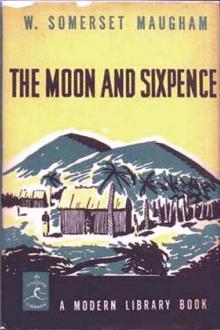author - "W. Somerset Maugham"

before. Mr. Crabbe was as dead as mutton, but Mr. Crabbe continued to write moral stories in rhymed couplets. I have read desultorily the writings of the younger generation. It may be that among them a more fervid Keats, a more ethereal Shelley, has already published numbers the world will willingly remember. I cannot tell. I admire their polish -- their youth is already so accomplished that it seems absurd to speak of promise -- I marvel at the felicity of their style; but with all their copiousness (their vocabulary suggests that they fingered Roget's Thesaurus in their cradles) they say nothing to me: to my mind they know too much and feel too obviously; I cannot stomach the heartiness with which they slap me on the back or the emotion with which they hurl themselves on my bosom; their passion seems to me a little anaemic and their dreams a trifle dull. I do not like them. I am on the shelf. I will continue to write moral stories in rhymed couplets. But I should be thrice a fool if I did it for a

you'd better," said Emma.
"Go in and tell them I'm coming," he said.
He wished to make the most of his opportunity. Emma knocked at the door and walked in. He heard her speak.
"Master Philip wants to say good-bye to you, miss."
There was a sudden hush of the conversation, and Philip limped in. Henrietta Watkin was a stout woman, with a red face and dyed hair. In those days to dye the hair excited comment, and Philip had heard much gossip at home when his godmother's changed colour. She lived with an elder sister, who had resigned herself contentedly to old age. Two ladies, whom Philip did not know, were calling, and they looked at him curiously.
"My poor child," said Miss Watkin, opening her arms.
She began to cry. Philip understood now why she had not been in to luncheon and why she wore a black dress. She could not speak.
"I've got to go home," said Philip, at last.
He disengaged himself from Miss Watkin's arms, and she kissed him again. Then he went t

Description
Considered by many to be Maugham’s masterpiece, Of Human Bondage is a semi-autobiographical coming-of-age tale. The novel follows Philip, a sensitive young man interested in literature and art, as he searches for happiness in London and Paris. Philip, the ostensible stand-in for Maugham, suffers from a club foot, a physical representation of the stutter that Maugham himself suffered. Philip’s love life, a central aspect to the book, also mirrors Maugham’s own stormy affairs.
Maugham originally titled the book “Beauty from Ashes” before settling on the final title, taken from a section of Spinoza’s Ethics in which he discusses how one’s inability to control one’s emotions results in a form of bondage.

before. Mr. Crabbe was as dead as mutton, but Mr. Crabbe continued to write moral stories in rhymed couplets. I have read desultorily the writings of the younger generation. It may be that among them a more fervid Keats, a more ethereal Shelley, has already published numbers the world will willingly remember. I cannot tell. I admire their polish -- their youth is already so accomplished that it seems absurd to speak of promise -- I marvel at the felicity of their style; but with all their copiousness (their vocabulary suggests that they fingered Roget's Thesaurus in their cradles) they say nothing to me: to my mind they know too much and feel too obviously; I cannot stomach the heartiness with which they slap me on the back or the emotion with which they hurl themselves on my bosom; their passion seems to me a little anaemic and their dreams a trifle dull. I do not like them. I am on the shelf. I will continue to write moral stories in rhymed couplets. But I should be thrice a fool if I did it for a

you'd better," said Emma.
"Go in and tell them I'm coming," he said.
He wished to make the most of his opportunity. Emma knocked at the door and walked in. He heard her speak.
"Master Philip wants to say good-bye to you, miss."
There was a sudden hush of the conversation, and Philip limped in. Henrietta Watkin was a stout woman, with a red face and dyed hair. In those days to dye the hair excited comment, and Philip had heard much gossip at home when his godmother's changed colour. She lived with an elder sister, who had resigned herself contentedly to old age. Two ladies, whom Philip did not know, were calling, and they looked at him curiously.
"My poor child," said Miss Watkin, opening her arms.
She began to cry. Philip understood now why she had not been in to luncheon and why she wore a black dress. She could not speak.
"I've got to go home," said Philip, at last.
He disengaged himself from Miss Watkin's arms, and she kissed him again. Then he went t

Description
Considered by many to be Maugham’s masterpiece, Of Human Bondage is a semi-autobiographical coming-of-age tale. The novel follows Philip, a sensitive young man interested in literature and art, as he searches for happiness in London and Paris. Philip, the ostensible stand-in for Maugham, suffers from a club foot, a physical representation of the stutter that Maugham himself suffered. Philip’s love life, a central aspect to the book, also mirrors Maugham’s own stormy affairs.
Maugham originally titled the book “Beauty from Ashes” before settling on the final title, taken from a section of Spinoza’s Ethics in which he discusses how one’s inability to control one’s emotions results in a form of bondage.
